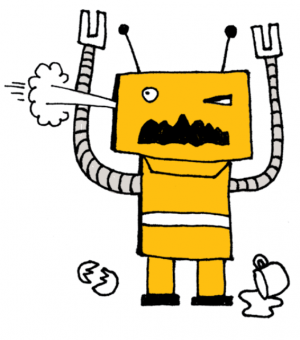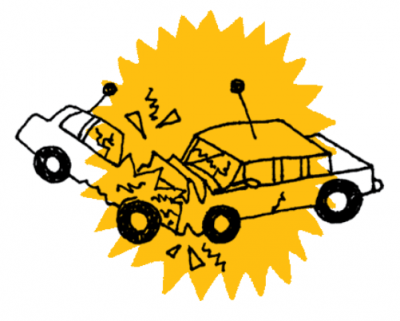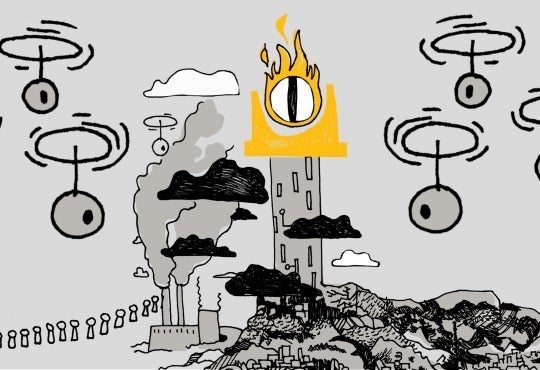In a 2014 interview with the BBC, physicist Stephen Hawking warned: “The development of full artificial intelligence could spell the end of the human race.”
From movies like The Terminator or Minority Report to modern television dramas including Homeland and Black Mirror, there is no shortage of fictional examples of technology used for nefarious purposes. But in a period of breakneck technological advances, could fiction ever become fact? Or has it already?
 We asked Nikolas Badminton, a global futurist and moderator of Waterloo’s future-focused Beyond 60 kickoff lecture and special curator of Hacking the Future: Waterloo Innovation Summit 2017, for his take on the real risk of some popular science-fiction scenarios.
We asked Nikolas Badminton, a global futurist and moderator of Waterloo’s future-focused Beyond 60 kickoff lecture and special curator of Hacking the Future: Waterloo Innovation Summit 2017, for his take on the real risk of some popular science-fiction scenarios.
The scenario: Rise of the machines/AI takes over (The Terminator)
 “Artificial intelligence is hitting the headlines every day. From poker-playing AI that makes other players feel like their cards are being read, through to self-driving vehicles and systems that threaten to remove our jobs. In fact, the Brookfield Institute at Ryerson University states that 42 per cent of Canadian jobs will be made obsolete through automation.
“Artificial intelligence is hitting the headlines every day. From poker-playing AI that makes other players feel like their cards are being read, through to self-driving vehicles and systems that threaten to remove our jobs. In fact, the Brookfield Institute at Ryerson University states that 42 per cent of Canadian jobs will be made obsolete through automation.
“Everything from administrative jobs to truck driving will be changed. There is the potential to terminate fun and livelihoods but we are a resilient race.
“We will build kind and helpful AI to help us. We will have new jobs to support them in data processing, data science, cybersecurity, monitoring, and machine training. We may even create human-AI relationships that last for years and ultimately we’ll make them more human. Terminator? Not really. More like a useful friend that never tires and has our back.”
The scenario: Hijacked autonomous vehicles (Minority Report)
 “We are careening towards a world where self-driving vehicles are commonplace. Google has Waymo, Tesla upgraded all their vehicles overnight with autonomous driving algorithms, and virtually every major car manufacturer has projects under way. These systems need to collect, process and use data on a second-by-second basis. That means scanning, input and output. That means security vulnerability.
“We are careening towards a world where self-driving vehicles are commonplace. Google has Waymo, Tesla upgraded all their vehicles overnight with autonomous driving algorithms, and virtually every major car manufacturer has projects under way. These systems need to collect, process and use data on a second-by-second basis. That means scanning, input and output. That means security vulnerability.
“Car manufacturers will have crack security teams fighting system breaches, and organized crime collaborating with black-hat hackers will turn from stealing personal details to driving your car away while you sleep.
“Cybersecurity will be one of the most sought-after technology jobs to have in any field that uses autonomous technology employing sensors for learning and control.”
The scenario: Ransomware threats to embedded medical devices (Homeland)
“Body hacking is now commonplace. We replace hips, adjust serotonin levels through pharmaceuticals, wear hearing aids and augment the hearts that pump our blood with pacemakers. As this gets more useful and technical — with more moving parts connected to the cloud — we will see vulnerability.
“Nefarious characters launch ransomware to hijack hospitals and transportation networks. Random occurrences? No. The FBI received over 4,200 reports of ransomware attacks with losses totalling nearly $50 million between April 2014 and the end of 2015.
“The unfortunate next targets will be high-networth humans who use prosthetics, pacemakers, insulin pumps and other devices to maintain health. Watch your backs, legs, pancreas, hearts etc.”
The scenario: Big Brother surveillance (1984)
“ ‘Big Brother is watching you,’ George Orwell professed.
“Today the ‘Big Brothers’ are watching you!
“Alphabet, Apple, Microsoft, Facebook, Uber, Tesla and other companies provide devices, systems you access and platforms for connection that harvest our data. They are reducing each person down to a cross-correlation of locations, contexts, social connections and keywords.
 “We are the product. We have little or no control over how our data is used, and no right to the money made from these companies selling services.
“We are the product. We have little or no control over how our data is used, and no right to the money made from these companies selling services.
“More of a concern is that governments are also collecting this data for intelligence. You might say ‘I have nothing to hide.’ That may be true but many stories can be created from combining data and creating conclusions. Guilty? It’s a matter of data, opinion, and situation.”
The scenario: Wearable devices used to deny medical coverage (Elysium)
“I have to hit that 10,000 steps a day goal every day. In 2017, I equate that to overall activity and fitness. My movement tracker makes me feel good.
“Going forward, it’s also going to make insurance companies feel good and create a level of personalization in custom meal plans, fitness schemes and health insurance premiums. Companies will reward the fit and penalize the unhealthy.
“There will be an upgraded version of ‘survival of the fittest’ which will be cross-graded to be called ‘biased benefits for the fittest.’ Governments will need to wise up and step up to create level playing fields through regulation that removes value in the data.”






